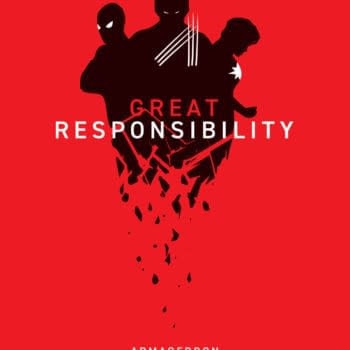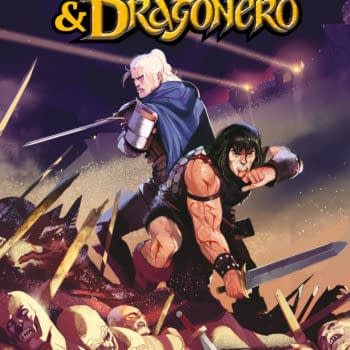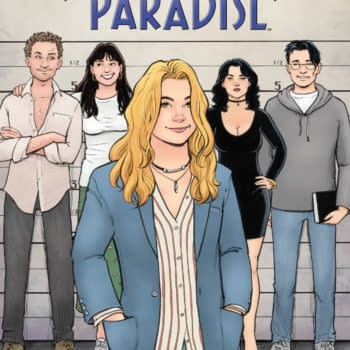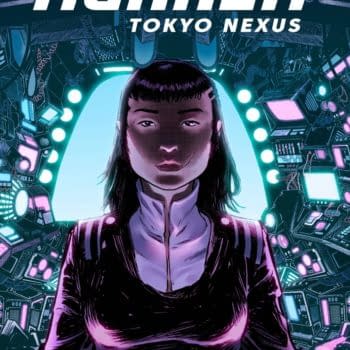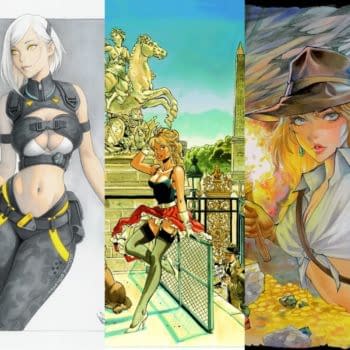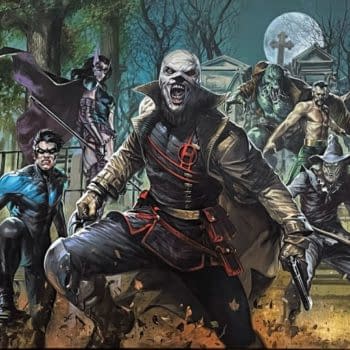Posted in: Comics, Recent Updates | Tagged: Comics, dungeons & dragons, entertainment, Greg Tocchini, image comics, low, rick remender
Talking New Image Book Low And The Futility of Existence With Rick Remender
By Emily Dare
Wednesday sees the long-anticipated release of Rick Remender and Greg Tocchini's new title from Image Comics: Low. Several months ago I had the chance to sit down with Rick and grill him about Low's origins and inspirations.
Emily Dare: You've mentioned earlier that Low was bringing out your "most Dungeon Master side" is Dungeons and Dragons a direct inspiration or is it more of the general vibe you're going for?
Rick Remender: It's structured the same way. It's a very character-based story where there are two last civilizations. There's the Kingdom of Solace which is a giant dome at the bottom of the ocean and then there's another world. The way I've structured the journey up from the bottom, is that every layer leads to a new thing they're encountering. As the radiation above seeps down into the water, the higher you go things are more mutated, and there are civilizations of vampire fish men and these kinds of things as you go up. In that way it really is sort of a Dungeon Master situation where as they explore they open up these doors and there's a giant fish vampire man and his evil pirate friends.
But more than that, it's mythological, because the technology that man had before they went to the bottom of the ocean was so far-and-away advanced and beyond what they have now that they have things like the Helm Suits, which is what you see on the cover of issue #1. There are only three of the Helm Suits left, and they were created by these scientists who wanted to make sure their progeny could perpetuate the safety of their descendents so the suits are DNA operated. They are these motherfucker suits and there used to be a lot of them, but now there's just three and they only work for certain families. Their bloodlines have carried the suits down from generation to generation. But these pirates have figured out that you can hack somebody's eyeball out and scoop out this and that, and take one of them over. They steal one, and now you're following what's left of this family as they reacquire the Helm Suit. That feels very fantasy to me. It really is fantasy set in super-future aquatic science fiction. The tech is the mythology now.
ED: Could you go into more detail on what your inspiration was for this setting?
RR: I was reading a National Geographic which was talking about how the sun is expanding and will at one point consume our solar system and then die as all stars do. I remember being seven and learning that fact for the first time and I remember concocting ways we could survive it. "Well, we'll have to fly to another planet by then! Or maybe we'll burrow under the oceans into the Earth while we figure it all out!" And I remembered thinking about how we were going to survive as the sun started to expand. It's a million-and-a-half or ten million years before this happens, it's a ways out there, but for the sake of fiction I'm saying it's a lot sooner — one hundred thousand or fifty thousand years from now. The idea was universal to me, and those are the ones I write down and say, "That's what I'm going to make into a book." It was universal in that I remember as a child knowing we're all going to have to deal with the fact this is so finite.
We know our sun will eventually expand and consume our planet so that means that whatever da Vinci did is a waste of fucking time. That means that everything is finite and it adds this sort of temporary nature to everything. I was so fascinated by this, even at seven that reading this article just brought up these fantasies. Then Greg Tocchini and I were working on Last Days of American Crime, so I pitched him on it, and set it up, and scheduled it, and we've been working on it since. He's got about fifty pages of designs and this whole bible filled with the worldbuilding we've done.
I've done books that don't have the sort of "Shazam!" universal themes, and the ones that have it, have something that anybody can connect to because of that. There is something about that version of the crazy science fiction future where it's at least identifiable because this is something we are, in fact, going to look down the barrell of one day.
ED: With all the books you're doing currently, Captain America, Uncanny Avengers, Deadly Class, Black Science and now Low, how is juggling five ongoing series treating you?
RR: It's gnarly. With Low I'm in a nice situation where I produced the outline for a long time ago and my editor Sebastian [Girner] and I beat it into shape about eight months ago. That's why it's so long; I've been compiling it and adding to the outline for years and years now. It's nice because I can just take a chunk, think up the story and write it much quicker than if I was sort of going from scratch. That enables me to burn through these things in a way I couldn't with something else. I'm outline-heavy on that and Captain America. With Deadly Class we're doing it a little differently; we have a pile of ideas and we'll just pick them. Black Science is incredibly outlined. Everything is tight up until about issue twenty-eight, I don't have to think at all. With Uncanny Avengers and all of that stuff, I'm not as far along, but the roadmap is there. I'm juggling it, but this is the breaking point, I have to stop doing more work so that I don't kill myself.
ED: Eric Stephenson called Low "Your next favorite book." What is the one thing we should know about Low going in?
RR: It's the first time I've ever written anything from the point-of-view of a character who is an eternal optimist who is facing awful and crushing odds. That is a challenge, I'm in therapy these days dealing with a lot of depression and I find that I wanted to challenge a character to sort of go through the same arc that I was going through. Which was to challenge my own negative thinking, which leads to these negative feelings which then leads to a jar of peanut butter at 4 a.m. filled with tears. It really is about optimism, and it really is about this inevitable conclusion that we all face with our planet getting eaten by the sun, which is going to fucking happen. It's about one character's optimism in the face of this and how she manages to use that optimism and spread that optimism to have a positive effect.
Of course, it's not an entirely happy ending.
ED: Has the process of dealing with a relentlessly optimistic character like that been at all cathartic?
RR: It forces me to try and find the voice I'm trying to learn to hear, if that makes any sense. It forces me to try to hear the voice that's not the bad voice, the voice that's like, "Hey, not everybody hates you! Not everybody's trying to get you! Not everything in the world sucks! Not every negative news article that you read needs to be this or good one needs to be that!" You can magnify the positive just as easily as you can magnify the negative. And all that shit, that "Kumbaya" utopian hippie bullshit that I used to wave my fist at as a punk in the 80's growing up — there's something to be said for a lot of it. There's something to be said for finding that optimism, because I do think that in some way we shape our reality.
When you read enough about astrophysics and the nature of the universe, they're theorizing now that matter and things don't even take shape until a living being looks at them. That's fascinating. It means that if I'm looking at something, it's a thousand parallel objects, it's a nebulous undulating thing of molecules until I look at it and then it takes form. If a tree falls in the forest, it actually doesn't make a sound. This is the science right now, it's theoretical, but this is what they're thinking and it just got me thinking that maybe optimistic thinking and a positive outlook really would change things. So I listen to a lot of Bad Brains, and I listen to a lot of H.R. singing about a positive mental attitude.
Emily Dare is a freelance writer who can be found on twitter as @moonandserpent where she attempts to maintain a positive attitude in the face of existential despair.











